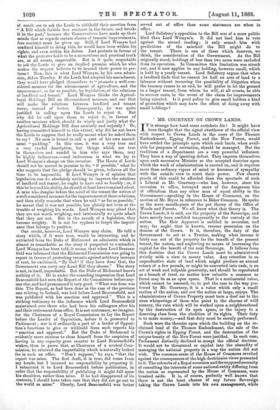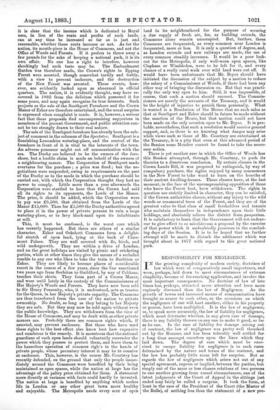MR. COURTNEY ON CROWN LANDS.
IT is strange how hard some crotchets die I It might have been thought that the signal overthrow of the official view with respect to Crown Lands in the cases of the Thames Embankment, Epping Forest, and the New Forest, would have settled the principle upon which such lands, when avail- able for purposes of recreation, should be managed. But the traditions of a Department are a very powerful influence. They have a way of ignoring defeat. They impress themselves upon each successive Minister as the accepted doctrine upon which the work of administration is carried on, and it requires more than ordinary vigour of mind or keenness of sympathy with the outside view to resist their power. Few clearer proofs of this could be afforded than the spectacle of such a Liberal as Mr. Courtney—who has, however, since his accession to office, betrayed more of the dangerous bias of officialism than any other man of equal ability in the Government—speaking in the House of Commons, on the motion of Mr. Bryce in reference to Esher Common. He spoke as the mere mouth-piece of the pet theory of the Office of Woods and Forests. We all know what that theory is. The Crown Lands, it is said, are the property of the Sovereign, and have merely been confided temporarily to the custody of the nation. The Heir Apparent is entitled in reversion, and may, for aught that is known, resume possession on the demise of the Crown. It is, therefore, the duty of the Government to act as a Trustee, making what income it fairly can out of the property for the benefit of the present tenant, the nation, and neglecting no means of increasing the capital for the benefit of the next Sovereign. It follows from this doctrine that the Crown Lands must be administered strictly with a view to money value. Any retention in an unproductive state of land which might produce an annual return of a few pounds, or might be converted into cash, is an act of weak and culpable generosity, and should be reprobated as a breach of trust, no matter how valuable a common or forest may be as an open space. That is a.sentimental value, which cannot be assessed, or, to put the case in the way pre- ferred by Mr. Courtney, it is a value which only a small section of the nation, and not the nation at large, enjoys. The administrators of Crown Property must turn a deaf ear to the siren whisperings of those who point to the charms of wild scenery, the ruin which will be worked upon a neighbourhood by the destruction of its open space, or the injury to a deserving class from the abolition of its rights. Their duty is to make money,—and that duty must be sternly performed.
Such were the theories upon which the building on the re-
claimed land of the Thames Embankment, the sale of the Crown's rights in Epping Forest, and the destruction of the unique beauty of the New Forest were justified. In each case, Parliament distinctly declined to accept the official doctrine. It would not be threatened or cajoled into the absurdity of managing the national property in a way the nation did not wish. The common-sense of the House of Commons revolted against the consequences of the high doctrinaire views presented to it. The cobwebs of a Royal reversion and the supposed necessity of consulting the interests of some national entity differing from the nation as represented by the House of Commons, were brushed aside. It is, of course, perfectly well known that there is not the least chance of any future Sovereign taking the Crown Lands into his own management, while it is clear that the income which is dedicated to Royal uses, in lien of the rents and profits of such lands, can at any time be increased so far as is just and reasonable, whether those rents increase or nob. As for the nation, its mouth-piece is the House of Commons, and not the Office of Woods and Forests. If it prefers to throw away a few pounds for the sake of keeping a national park, it is its own affair. No one has a right to interfere, however shockingly bad such taste may be. The Embankment Garden was therefore made, the Crown's rights in Epping Forest were asserted, though somewhat tardily and feebly, with a view to prevent inclosure, and the destruction of the New Forest was arrested. These events, how- ever, are evidently looked upon as abnormal in official quarters. The nation, it is evidently thought, may have re- covered in 1883 from the delirium which possessed it for some years, and may again recognise its true interests. Such projects as the sale of the Southport Foreshore and the Crown Manor of Esher are therefore entertained, and the usual surprise is expressed when complaint is made. It is, however, a serious fact that these proposals find uncompromising supporters in members of the present Government, and public attention can- not be too strongly drawn to their real nature.
The sale of the Southport foreshore has already been the sub- ject of comment in the columns of the Spectator. Southport is a flourishing Lancashire watering-place, and the control of the foreshore in front of it is vital to the interests of the town. An adverse possessor might cut off communication with the sea. The Duchy are believed to be the owners of the fore- shore, but a hostile claim is made on behalf of the owners of a neighbouring manor. The Corporation of Southport made overtures for the purchase ; a price was fixed ; but the ne- gotiations were suspended, owing to requirements on the part of the Duchy as to the mode in which the purchase should be carried out, with which the Corporation thought they had no power to comply. Little more than a year afterwards the Corporation were startled to hear that the Crown had sold all its rights to its opponents, the Lords of the Manor.
The price, it should be added, which the Corporation were to pay was £9,500, that obtained from the Lords of the Manor £15,000. Thus for £5,500 the Duchy authorities agreed to place it in the power of private persons to ruin a large watering-place, or to levy black-mail upon its inhabitants at will.
This, it must be confessed, is the worst case which has recently happened. Bat there are others of a similar
character. Esher and Ockshott Commons form a delight- ful stretch of open land, lying at the back of Clare- mont Palace. They are well covered with fir, birch, and wild undergrowth. They are within a drive of London, and on the great holidays are visited by picnic and cricketing parties, while at other times they give the means of a secluded ramble to any one who likes to take the train to Surbiton or Esher. They are likely to become places of considerable resort in the course of a few years, since the line sanctioned two years ago from Surbiton to Guildford, by way of Cobham, touches their skirts. They form part of a Crown Manor, and were until lately in the custody of the Commissioners of Her Majesty's Woods and Forests. They have now been sold to Sir Henry Ponsonby, who, it is understood, acts as trustee for the Queen, in her Majesty's private capacity. The Commons are thus transferred from the care of the nation to private ownership. No doubt, so long as they being to her Majesty they are safe. But they may now be sold again without even the public knowledge. They are withdrawn from the view of the House of Commons, and may be dealt with as other private manors are. Probably there are common rights which, if asserted, may prevent enclosure. But those who have used these rights to the best effect also know best how expensive and cumbrous is the remedy. It is monstrous that the national guardians of such open lands should voluntarily surrender the power which they possess to protect them, and leave them to the hazardous operation of common righ4a in the hands of private people, whose pecuniary interest it may be to connive at enclosure. This, however, is the course Mr. Courtney has recently defended, on the ground that only the people imme- diately around the Commons were benefited by their being maintained as open spaces, while the nation at large has the advantage of the paltry price obtained for them. A statement more directly at variance with facts could hardly be invented. The nation at large is benefited by anything which makes life in London or any other great town more healthy and enjoyable. The Metropolis needs every acre of open
land in its neighbourhood for the purpose of securing a due supply of fresh air, for, as building extends, the Commons alone remain unoccupied. But, further, these Commons are frequented, as every common near London is frequented, more or less. It is only a question of degree, and, as London extends and new railways are made, the use of every common steadily increases. It would be a poor look- out for the Metropolis, if only well-worn open spaces, like Clapham or Wimbledon, were to be left for it, and every chance of a really rural walk over wild land were cut off. It would have been unfortunate that Mr. Bryce should have initiated the discussion of the subject by a motion to reduce the salary of a Commissioner of Woods, if there had been any other way of bringing the discussion on. But that was practi- cally the only way open to him. Still, it was impossible, of course, that such a motion should succeed. The Commis- sioners are merely the servants of the Treasury, and it would be the height of injustice to punish them personally. What is wanted is a Resolution of the House that no such sales as that at Southport and Esher should in future be made without the sanction of the House, but that motion could not have been made on the only occasion open to Mr. Bryce. It is pro- bable, nevertheless, that such a resolution would receive general support, and, as there is no knowing what danger may arise while views such as those of Mr. Courtney are entertained at the Treasury, it is a pity that even at this advanced period of the Session some Member cannot be found to take the neces- sary action.
There is yet another case in which the Office of Woods has this Session attempted, through Mr. Courtney, to push its theories to a disastrous conclusion. By certain clauses in the Crown Lands Bill, it was proposed to extinguish, by way of compulsory purchase, the rights enjoyed by many commoners in the New Forest to take wood to burn on the hearths of their ancient dwelling-houses. These clauses have, at the last moment, in the face of the uncompromising opposition of those who know the Forest best, been withdrawn. The rights in question are strictly limited in character, they can be satisfied, if the Crown authorities choose, without any injury to the wild woods or ornamental trees of the Forest, and they are of the greatest value to that class of small freeholders and tenants who maintain themselves in independence upon their little holdings, and absolutely relieve the district from pauperism. It is satisfactory to learn that the Government will not endeav- our to give effect to so mischievous a proposal by the exercise of that power which it undoubtedly possesses in the conclud- ing days of the Session. It is to be hoped that no further attempt will be made to disturb the settlement which was brought about in 1877 with regard to this great national park.



































 Previous page
Previous page